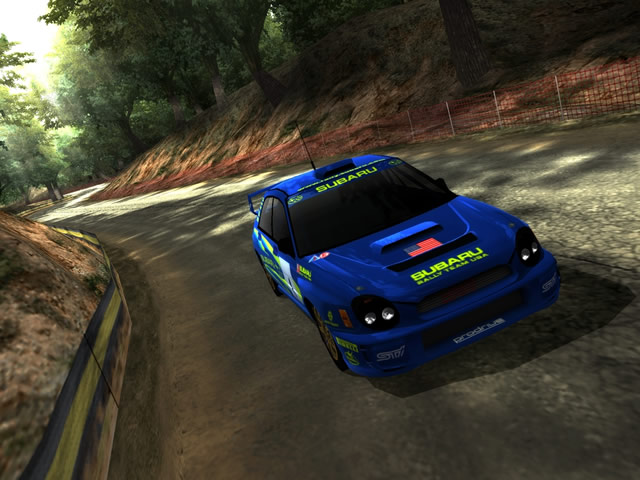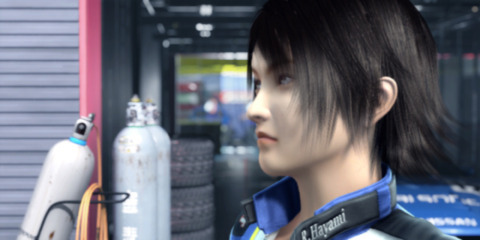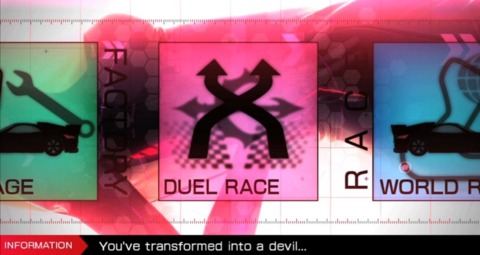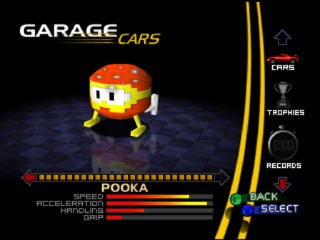Ridge Ranker Epilogue
By PistonHyundai 0 Comments
With the main rankings out of the way, there's still a few loose ends and things that didn't quite fit on the list proper that I want to touch on before closing the book on Ridge Racer.
R: Racing Evolution - Sony PlayStation 2/Microsoft Xbox/Nintendo GameCube, 2003

A Missing Link
I wasn't planning on talking about R: Racing Evolution, but after spending some hands-on time with it, I realized that I'd be making a mistake in not covering it. It's a bit of a confounding game, made presumably as a result of Namco's success with the MotoGP license. Breaking from the Ridge Racer mold, R: Racing Evolution is a sim racer that features real-life tracks, GT cars and brands (no Dig Dug brand car parts here), looking to compete with the Gran Turismos of the world. Unfortunately, it flounders because of a problem found in nearly every aspect of the game: it has no idea what the hell it wants to be.
Gameplay reminds me a lot of DriveClub: trapped between the snappy response of arcade racers and the realism of a simulation. It tries to have it both ways: braking early is emphasized, but collisions only cause a negligible speed hit and won't damage your vehicle. Drifting is both encouraged through cash bonuses and discouraged through harsh speed penalties and spinouts. You have plenty of options to tweak your car with before a race (traction/stability control, brake bias, differential, etc.), but most cars handle far too similarly regardless of configuration, with turning that feels too stiff for wide turns yet too twitchy for tight ones. Worst of all of this is how you never get a great sense of speed even as you unlock cars that can approach the 200MPH mark, robbing the racing of most of its excitement. There's an interesting mechanic where you can put pressure on opponents by sticking close to them until their nerves eventually cause them to make a mistake (they'll even react to your presence with radio chatter, cursing your name as they spin out or veer off-course), but despite the iffy controls, most races are so easy that you can win them without having to ever do this. The circuit racing is supported by the occasional rally course or drag race (the latter likely being thrown in because of its popularity in street racing games of the era), but both of these are too undercooked and insubstantial to be worthy diversions. By taking a middle ground approach, Racing Evolution has neither the rush of Ridge Racer nor the feeling you get when you hit a turn's apex in Gran Turismo.

The main reason I wanted to touch on Racing Evolution is its story mode, which is the closest connection the game has to its Ridge Racer roots. Titled "Racing Life," the story follows ambulance driver Rena Hayami, who after quickly delivering a racer to the hospital following a crash, is recruited by race team manager Stephan Garnier (Seemingly voiced by Michael McConnohie, who can't not sound like the Agency leader from Crackdown in this game. Garnier's speech here about a race is delivered with the same cadence heard in Crackdown's intro, and it cracks me up). As Rena ascends the racing scene, she finds herself in a rivalry with fellow racer Gina Cavelli (who could stand to zip her jumpsuit up a bit) and soon learns that Garnier's team is tied to G.V.I., a secretive corporation that pulls the strings from behind the scenes. There's some serious potential here, and you catch the occasional glimpse of intrigue (like when Garnier instructs you to throw a race on the final lap), but they never pull any serious triggers, keeping stakes way too low. Now maybe I'm just more lax on high-stakes gambling (that isn't even confirmed as illegal in-game) than others, but the story left me wondering why the corporate cabal you race for is so evil in the first place. The most the game does to sell G.V.I. as evil is through some eye-roll inducing cutscenes that frame them like they're some sort of Dr. Claw-style supervillains. Without any action, the vague threat from their leader at the end of the game may as well be alluding to something as inert as a damn pay cut. It's the game's most heartbreaking quality because it's so clearly trying to pick up from where R4's Grand Prix left off (Garnier's backstory even mirrors that of R4's Enki Gilbert), but instead of having the borderline-campy charm or style of R4, Racing Life is just there, afraid to commit to anything interesting.
Just a blip on the radar, R: Racing Revolution came and went with mediocre reviews and sales. The most attention Namco's given the game since is through Ridge Racer 6 (where the game's admittedly decent soundtrack is available as DLC), and I'd be lying if I said I wasn't disappointed by that. It doesn't come together at all in the game, but there's just something in the story mode that a future Ridge Racer game could make shine if they really ran with it. Imagine how crazy it would be if they made a game that took the Metal Gear Solid approach to storytelling and did for racing games what their own Ace Combat did for flight sims.
Planetary Sounds
Back in the introduction for this series, I wrote off the Vita version of Ridge Racer pretty succinctly. I stand by not putting on the list (without the paid DLC it's practically as much of a game as the pack-in "First Hunt" demo of Metroid Prime: Hunters was), but I was a little hasty in saying it had nothing of note to offer. The game may have an embarrassing amount of races, all of which are recycled from prior games, but it does have a new soundtrack that's worth a quick look. I don't think much of the music is particularly great, but as the most recent original Ridge Racer soundtrack, it's interesting to hear a sound that's a little more informed by the music of the time, like in the dubstep-influenced Planet. It's also a bit more vocally-driven than previous soundtracks, often eschewing samples for the voice talents of Aimee Blackschleger (a voice heard frequently in Bemani games such as Beatmania and Dance Dance Revolution). It's a relatively small soundtrack, but some new (and a ton of old) music made its way into the game as DLC, including the "USA Mix" of the original "Ridge Racer," which is graced by the singing of Daytona USA's crown jewel, Takenobu Mitsuyoshi.
Trivia and Miscellany
- The Vita Ridge Racer's problems aren't limited to a sparse selection of tracks and vehicles. It has an online focus that doesn't really amount to anything, where you choose a faction based on one of four PlayStation face buttons (or in the case of the Trianchor Alliance team, the Evil Council from Kung Pow: Enter the Fist) and compete against the others. While it's a decent enough idea on paper that could alleviate some of that dreaded repetitive feeling, the lack of structure, rewards, or any real purpose means it has zero impact on the game. The Vita game also ruins a lot of the customization seen in Ridge Racer 7: cosmetics have been reduced to a choice in paintjob, and the performance upgrades are largely tied to a skill tree that leads to a lot of grinding and forces you to waste money on hints to get to actual improvements for your ride. There's even a leveling system that just makes you outright faster, turning the notion of balance during online play into a farce. Then again, this isn't actually a problem considering that nobody's playing the damn thing online.

- Credit where credit's due: the Vita game actually has a pretty cool method of unlocking the Devil car. After you race against a player or Time Attack ghost that has the car, you will receive the "Devil's Gift." This might sound like some crazy bugchaser bullshit, but what it actually does is put a demonic spin on the main menu (including an evil Reiko Nagase with devil horns) that won't go away until you defeat the Crinale Devil car in a series of Duel Races, which also unlocks both the car itself and the ability to challenge the Angel car. It's probably the best thing to come out of the game's online focus and is a neat take on the "viral" achievements and unlocks you used to see so much in the last generation of consoles.
- Speaking of the Crinale, the Ridge Racer V version of the Devil car also appears in the PS2's Critical Velocity, a story based open-world driving game that's best described as a Japanese take on Driver. The best part about this game's Ridge Racer connection is how you can come across Seaside Route 765 integrated as a part of the game's open world. Unfortunately, the game doesn't appear to be very good and never left Japan.
- The first Ridge Racer's soundtrack has a unique quirk to it. In the arcade release and on official soundtracks, each of the songs' titles have remix names attached to them, like "Ridge Racer (Power Remix)" or "Rhythm Shift (12" Version)." None of these songs are actually remixes, this is just a tribute to the electronic music that influenced the soundtrack, where it's not uncommon to come across songs that have eight-hundred different dance mixes.
- One of my favorite parts of Ridge Racer's music is how a lot of the series' songs will build to a crescendo that is almost always the best part of their respective tracks. Some songs may culminate with tributes to other Namco games (the Rare Hero series of tracks pay homage to Rally-X and Pole Position, while the PSP's Synthetic Life pulls double duty and honors both Xevious and Galaga in one go) while others will let the song's intensity reach a thrilling climax (the buildup and release in Nitro Witch is so fucking good oh my fucking god), but my favorite examples come from Rave Racer. This soundtrack in particular (which, upon further reflection, is totally the best in the series) makes it a point to subvert this trend, seeing a few of its songs (EXH* Notes, Yororeri Hey, Teknopera) flip the dynamic and peak with entrancingly chill breakdowns.
- One of the most obscure artifacts of the series is the LaserDisc release, known as Ridge Racer LD. It isn't a bizarre FMV game like you might hope, but it's interesting nonetheless. One side of the LaserDisc features videos of Ridge Racer 1 and 2 being played, while the other is a soundtrack featuring remixes (which was later released as a separate, perfectly-named CD). The video component of the disc made its way to YouTube and is worth checking out just for the "Acrobatic Runnings" portion, which is a skill exhibition that plays out like a long-lost relative of those ridiculous MLG compilation videos everyone used to parody. I have no idea how they got the cars on two wheels like that.

- Ridge Racer 64 and DS have a "Renegade" set of 3 tracks that take place in an arid desert, as well as a "Ridge Racer Extreme" circuit that imagines what the outskirts of the original Ridge Racer course would look like. They're okay tracks, but I think Ridge Racer 3D's Redstone Thunder Road is a more interesting take on the southwestern environment.
- The Nintendo exclusives also have a great selection of unlockable cars, including re-imagined classics, vehicles influenced by both Namco and Nintendo hits (including cars named 00 Agent and Ultra 64), and best of all, a Pooka.
The Finish Line
With that, I think I'm just about finished with these blogs. If a new Ridge Racer comes around, maybe I'll throw a review of it up here or something like that, but I'm about ready to take a break from the series for the foreseeable future. I've thrown the words "Ridge Racer" around so many god damn times this past month or so that they've lost meaning, and if I keep at it at this rate they'll probably find me in a ditch somewhere because I flipped a Chevy trying to build up a nonexistent nitrous boost. If you've stuck around this long, hopefully this all has sparked an interest in some of the games you may have missed, turned you onto some dope music, or at least taught a few things about the series. Either way, thanks for sticking with it.
